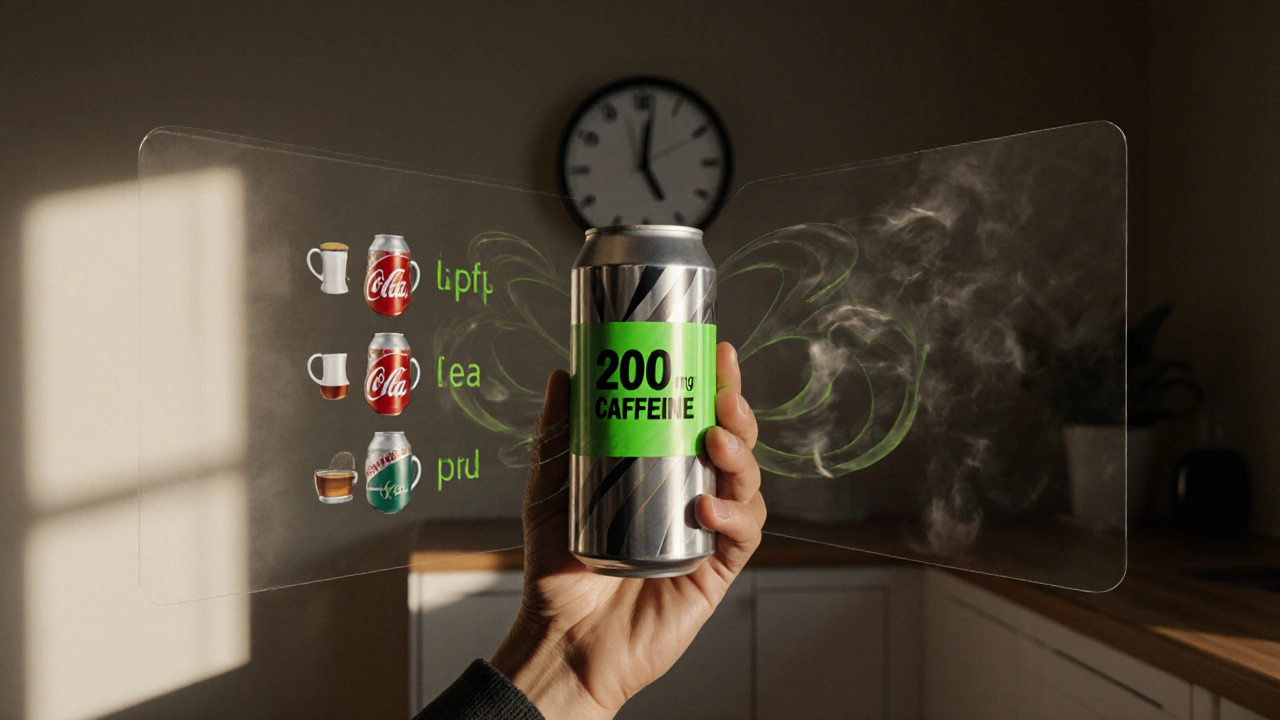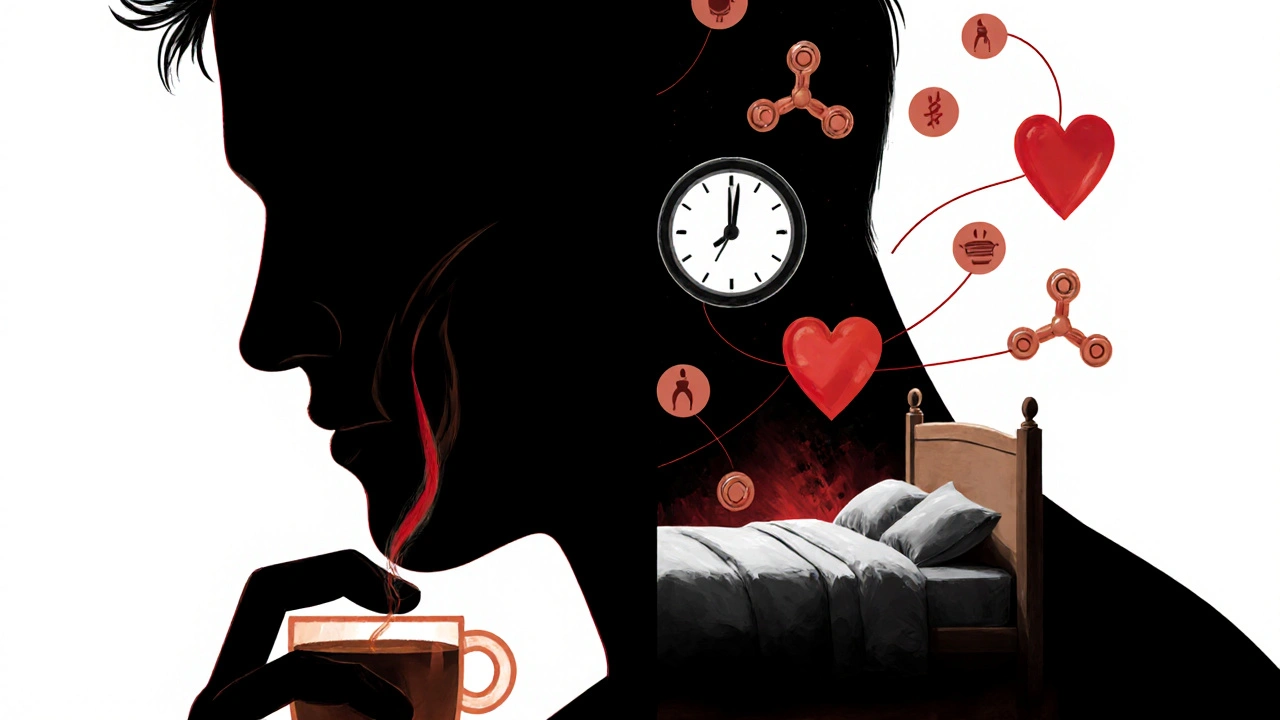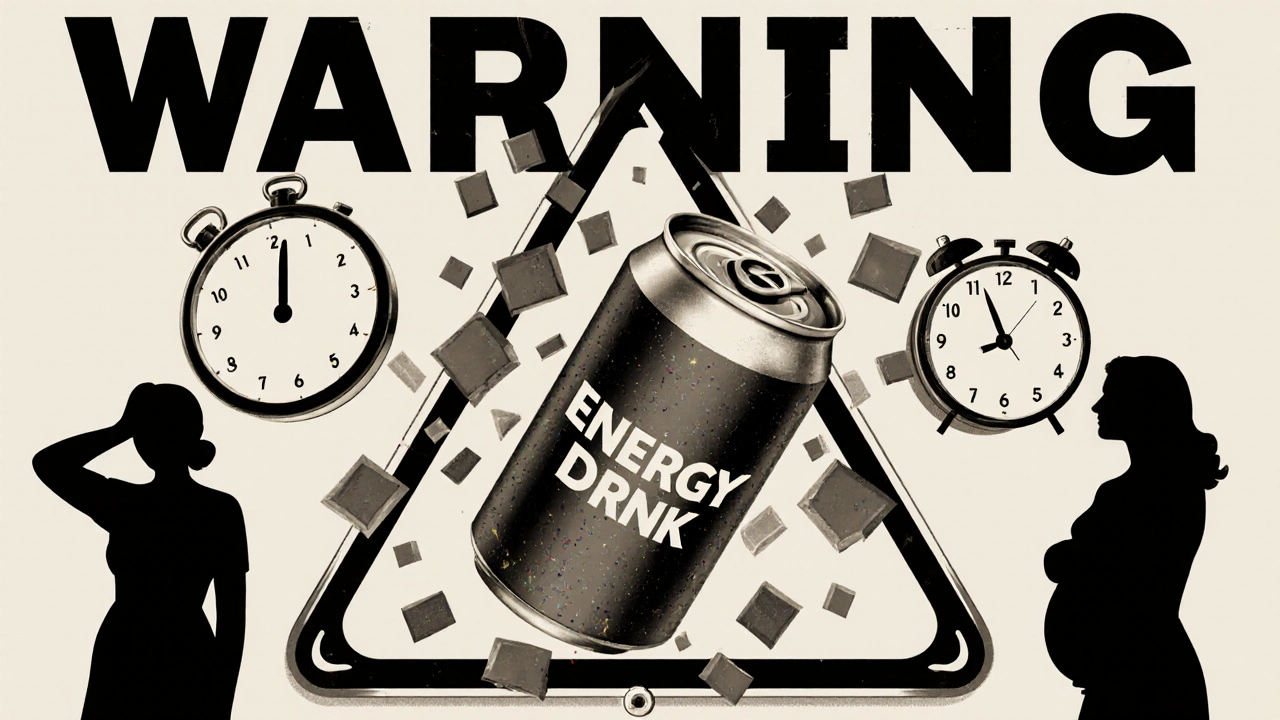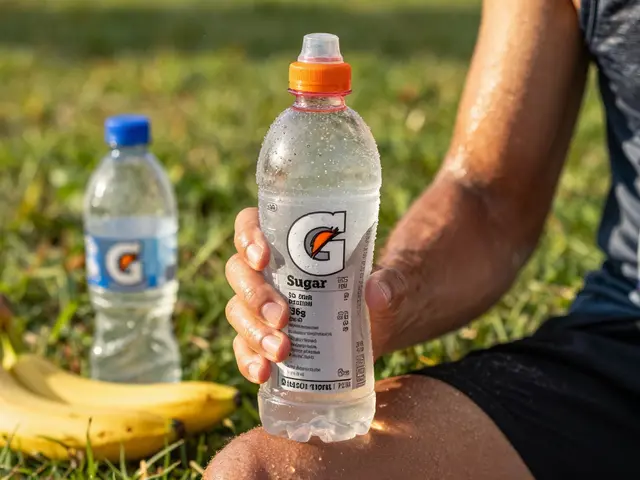Is 200 mg of caffeine a lot? What it means for your energy drinks and daily health

You grab a can of energy drink, check the label, and see 200 mg of caffeine. Your heart skips a beat-not because of the caffeine, but because you’re wondering: is that a lot? The answer isn’t as simple as yes or no. It depends on who you are, what you’re used to, and what else is in your body right now.
What does 200 mg of caffeine actually do?
Two hundred milligrams of caffeine is about the same as two cups of brewed coffee or one large energy drink. It’s enough to make you feel alert, focused, and maybe even a little jittery. For someone who doesn’t drink caffeine often, this amount can cause a noticeable spike in heart rate, mild anxiety, or even trouble falling asleep later that night.
But for a regular coffee drinker or someone who downs energy drinks daily? It might feel like a gentle nudge. Your body adapts. Tolerance builds. That’s why two people can have the same 200 mg dose and have completely different reactions.
Studies from the U.S. Food and Drug Administration (FDA) and the European Food Safety Authority (EFSA) agree: up to 400 mg of caffeine per day is generally safe for healthy adults. That means 200 mg is only half the daily limit. But here’s the catch-many people don’t stop at one drink. They have coffee in the morning, an energy drink at lunch, and maybe a soda in the afternoon. Suddenly, you’re hitting 300-500 mg without even trying.
How does 200 mg compare to other sources?
Not all caffeine is created equal. Here’s how 200 mg stacks up against common sources:
| Source | Caffeine (mg) |
|---|---|
| Energy drink (standard can) | 160-200 |
| Black coffee (8 oz) | 95-165 |
| Espresso (1 shot) | 63 |
| Green tea (8 oz) | 25-45 |
| Dark chocolate (1 oz) | 12-25 |
| Cola (12 oz) | 30-40 |
So if you’re drinking one 200 mg energy drink, you’re getting more caffeine than two cups of coffee-or six cans of cola. That’s a concentrated hit. Energy drinks pack caffeine into a small volume, often with added sugar, taurine, and B-vitamins. These don’t make the caffeine stronger, but they can change how your body processes it.
Who should avoid 200 mg of caffeine?
Not everyone should be drinking energy drinks with 200 mg of caffeine. Here are the groups who need to be careful:
- Teens and young adults: The American Academy of Pediatrics recommends no more than 100 mg per day for adolescents. Many teens are hitting 200 mg or more from energy drinks, sports drinks, and coffee. That can lead to heart palpitations, sleep loss, and even anxiety disorders.
- Pregnant women: The March of Dimes and the American College of Obstetricians and Gynecologists advise staying under 200 mg per day. Some experts say even less-150 mg is safer. That one energy drink could be your entire daily limit.
- People with heart conditions: Caffeine raises blood pressure and can trigger arrhythmias in sensitive individuals. If you’ve been told to limit stimulants, 200 mg is risky.
- People on certain medications: Antidepressants, asthma meds, and some antibiotics can interact with caffeine, making side effects worse.
And if you’re not in one of those groups, that doesn’t mean you’re safe. Caffeine sensitivity isn’t just about age or health-it’s also about genetics. Some people have a gene variant (CYP1A2) that breaks down caffeine slowly. For them, 200 mg can stay in their system for over 8 hours. That’s why you might feel wired at midnight after a 3 p.m. energy drink.

How long does 200 mg of caffeine last?
Caffeine hits your bloodstream in about 15-45 minutes. Peak effects come around 1 hour after consumption. But it doesn’t just disappear after that. Half of it is still in your system after 5-6 hours. That’s the half-life.
So if you drink a 200 mg energy drink at 2 p.m., you still have about 100 mg in your body at 8 p.m. And if you’re trying to sleep? That’s enough to delay sleep onset, reduce deep sleep, and leave you feeling tired the next day-even if you think you slept fine.
Most people don’t realize how long caffeine lingers. They think, “I had it at lunch, it’s gone by dinner.” But if you’re having trouble sleeping, or waking up at 3 a.m. feeling alert, caffeine could be the silent culprit.
What happens if you have too much?
200 mg alone won’t kill you. But if you’re combining it with other sources-or if you’re especially sensitive-you can start to see symptoms like:
- Rapid heartbeat or palpitations
- Shakiness or tremors
- Stomach upset or nausea
- Headaches
- Increased anxiety or panic attacks
- Insomnia or disrupted sleep
In extreme cases-usually over 1,000 mg in a short time-caffeine can cause seizures, irregular heart rhythms, or even death. But that’s rare. Most people who have problems are mixing energy drinks with alcohol, working out hard, or taking supplements that also contain stimulants.
There’s been a rise in emergency room visits linked to energy drinks, especially among young adults. In 2023, U.S. poison control centers reported over 2,500 cases of caffeine overdose from energy drinks. Many involved doses between 300-500 mg. 200 mg is on the edge-close enough to cause trouble if you’re not careful.

How to manage your caffeine intake
If you’re drinking energy drinks with 200 mg of caffeine regularly, here’s how to stay in control:
- Track everything. Write down every source: coffee, tea, soda, chocolate, pre-workout, energy drinks. You’ll be shocked how fast it adds up.
- Set a daily cap. Stick to 200 mg or less if you’re not a regular user. Even 100 mg is plenty for most people.
- Avoid it after 2 p.m.. That gives your body time to clear it before bed.
- Switch to half-caff or decaf on days you don’t need the boost.
- Hydrate. Caffeine is a diuretic. Drink water to balance it out.
And if you’re trying to cut back? Don’t quit cold turkey. You’ll get headaches and fatigue. Instead, reduce by 25-50 mg every few days. Your body will adjust without the crash.
Is 200 mg of caffeine too much for you?
There’s no universal answer. For some, it’s a harmless pick-me-up. For others, it’s the start of a sleepless night or a racing heart. The best way to know is to listen to your body.
Ask yourself:
- Do I feel jittery or anxious after drinking it?
- Do I have trouble sleeping, even if I drink it early?
- Do I need it just to feel normal?
- Am I drinking more than one a day?
If you answered yes to any of those, 200 mg might be too much. And if you’re unsure? Try cutting it in half for a week. See how you feel. You might discover you don’t need the energy drink at all.
Energy drinks aren’t evil. But they’re not health food either. They’re designed to give you a quick boost-and sometimes, that boost comes with a price. 200 mg of caffeine is a lot if you’re not used to it. It’s just right if you know your limits. The key isn’t the number on the can. It’s knowing what your body can handle.
Is 200 mg of caffeine safe for adults?
Yes, 200 mg of caffeine is generally safe for healthy adults. Health agencies like the FDA and EFSA say up to 400 mg per day is safe for most people. But safety depends on individual factors like body weight, tolerance, and health conditions. If you’re sensitive to caffeine or have heart issues, even 200 mg might be too much.
Can 200 mg of caffeine cause anxiety?
Yes, especially if you’re not used to caffeine or if you’re already prone to anxiety. Caffeine stimulates the nervous system and can trigger or worsen feelings of nervousness, restlessness, and panic. People with anxiety disorders are often advised to limit caffeine to 100 mg or less per day.
How long does 200 mg of caffeine last in the body?
The effects peak within an hour, but caffeine has a half-life of 5-6 hours. That means half of it (100 mg) is still in your system after 5-6 hours. For slow metabolizers, it can linger for 8-10 hours. That’s why drinking energy drinks after lunch can mess with your sleep.
Is 200 mg of caffeine too much for teens?
Yes. The American Academy of Pediatrics recommends teens avoid more than 100 mg of caffeine per day. Energy drinks with 200 mg are too strong for developing bodies and can affect sleep, mood, and heart health. Many teens who drink them regularly report headaches, anxiety, and trouble concentrating in school.
Does 200 mg of caffeine help with workouts?
Yes, 200 mg of caffeine can improve endurance, reduce perceived effort, and boost focus during exercise. Many athletes use it for this reason. But if you’re not used to caffeine, it can cause jitters, nausea, or increased heart rate during a workout. Start with 100 mg and see how your body responds.
Can you overdose on 200 mg of caffeine?
It’s very unlikely to overdose on just 200 mg. Caffeine overdose usually happens with doses over 1,000 mg in a short time. But if you’re combining it with other stimulants, medications, or alcohol, even 200 mg can become dangerous. Always check labels and avoid mixing energy drinks with other stimulants.
What are some alternatives to energy drinks with 200 mg of caffeine?
Try green tea (25-45 mg), black coffee (95-165 mg), or a small can of low-caffeine energy drink (50-100 mg). You can also boost energy naturally: drink water, take a 10-minute walk, get sunlight, or eat a snack with protein and complex carbs. These give steady energy without the crash.
Final thought: It’s not the number-it’s the pattern
One 200 mg energy drink isn’t going to ruin your health. But if it’s your daily habit? That’s when problems start. Sleep loss. Digestive issues. Dependence. A racing heart. The real danger isn’t the caffeine in one can. It’s the idea that you need it to function.
Your body doesn’t need energy drinks. It needs sleep, water, movement, and real food. Caffeine is a tool-not a crutch. Use it wisely, and it can help. Rely on it too much, and it’ll start working against you.






Comments (15)
Tia Muzdalifah
12 Nov 2025
200mg is wild if you’re not used to it. I tried one once after pulling an all-nighter and felt like my heart was trying to escape my chest. 🤯 Now I stick to green tea. No regrets.
michael T
13 Nov 2025
you ever notice how energy drinks are just liquid anxiety with a sugar rush? i used to chug them like water til my hands shook for 3 hours straight. now i just drink water and nap. same energy, less panic. 😭
Aafreen Khan
14 Nov 2025
lol 200mg? in india we call that a tea shot. my uncle drinks 6 cups of filter coffee a day and still runs marathons. caffeine is just a myth made by big pharma to sell you decaf. ☕️💀
Albert Navat
14 Nov 2025
Let’s be real - the real issue isn’t the 200mg, it’s the synergistic neurostimulant cocktail. Taurine + B-vitamins + sucralose creates a glycemic rollercoaster that dysregulates your HPA axis. You think you’re wired, but you’re just in sympathetic overdrive. 🧠⚡
King Medoo
16 Nov 2025
People act like caffeine is harmless... but have you ever seen the FDA’s reports on ER visits from energy drinks? It’s not just about tolerance - it’s about cumulative damage. Your heart doesn’t forget. I’ve seen 19-year-olds with atrial fibrillation because they thought ‘it’s just an energy drink.’ 😔
Rae Blackburn
16 Nov 2025
They’re hiding something. Why do energy drinks have 200mg but coffee shops don’t list exact caffeine? Big Soda is lying to you. The government knows. They don’t want you to know how fast your body burns out. Wake up. 🕵️♀️
LeVar Trotter
16 Nov 2025
As someone who’s coached college athletes, 200mg is a legit performance enhancer - but only if you’re trained, hydrated, and not using it to replace sleep. The problem isn’t the dose, it’s the dependency culture. You don’t need caffeine to be productive. You need rest. And maybe a walk outside.
Zoe Hill
17 Nov 2025
i read this whole thing and i still dont know if its too much… but i do know that after my 3pm monster i crash harder than a toddler after candy. maybe i just need to drink less? or nap? or both? 😅
Seraphina Nero
18 Nov 2025
I used to drink two of these a day. Then I started sleeping 8 hours and realized I didn’t need them. My anxiety went down, my skin cleared up, and I didn’t feel like a nervous raccoon anymore. Just… less caffeine. No magic.
Robert Byrne
19 Nov 2025
You people are acting like 200mg is some dangerous drug. I’ve had 400mg before, no problem. If you can’t handle it, that’s on you - not the drink. Stop being so fragile. I’ve worked 18-hour shifts on this stuff and still crushed it. Grow up.
Stephanie Serblowski
20 Nov 2025
Robert, bless your heart, you’re the reason we have ERs full of 20-year-olds with tachycardia. Maybe ‘crushing it’ isn’t worth losing your rhythm? Just a thought. 💖
Tyler Durden
22 Nov 2025
My cousin’s a firefighter - drinks 3 energy drinks a shift. Said he used to get panic attacks until he switched to black coffee + electrolytes. Now he’s got focus without the shakes. Point is: it’s not about the number, it’s about the combo. And hydration. Always hydrate.
Renea Maxima
22 Nov 2025
Is caffeine even real? Or is it just a social construct designed to make us compliant workers? We’ve been trained to equate alertness with virtue. But what if rest is the true rebellion? 🌿
Sagar Malik
23 Nov 2025
Let’s not forget the glyphosate in the corn syrup used to sweeten these beverages - it bioaccumulates in the liver and synergizes with caffeine to induce mitochondrial dysfunction. The FDA’s 400mg limit is based on 1980s data from sedentary white males. This is systemic pseudoscience.
Pamela Watson
24 Nov 2025
Wait so 200mg is bad for teens but fine for adults? So like… I can drink it if I’m 18? 😮 I’m 17 and I drink 2 a day… am I gonna die? 😭